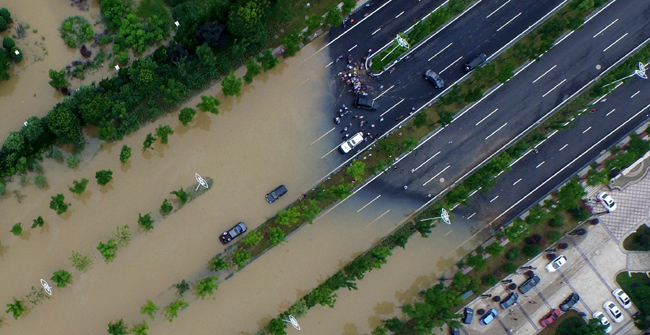China strongly dissatisfied with Japan's new defense white paper
Updated: 2015-07-22 09:35
(Xinhua)
|
|||||||||||
BEIJING - China on Tuesday voiced strong discontent and firm opposition over Japan's annual defense white paper, saying the paper deliberately plays up the so-called "China military threat".
The Japanese cabinet on Tuesday approved the defense white paper for 2015, in which it launched multiple accusations against China.
In the opening of the 400-plus page document, Japan describes the security environment surrounding the country as having become increasingly severe, highlighting China's supposed military build-up, and activities by China in the East China Sea and South China Sea.
In response to Japan's criticism, Chinese Foreign Ministry spokesperson Lu Kang said the new defense white paper of Japan once again ignores facts, makes irresponsible remarks on China's normal military growth and maritime activities, deliberately plays up the "China threat" and stirs up tensions.
In a press release, Lu stressed that China is committed to a path of peaceful development and national defense policy that is defensive in nature.
China's strategic intentions are transparent, he said, noting China's development of defense capacity is justified and poses no threat to any other country.
He said China is devoted to promoting China-Japan friendship and developing bilateral ties based on the four political documents signed by China and Japan.
He urged Japan to stop misleading the Japanese people or installing barriers for the improvement of bilateral ties.
China always carries out normal maritime activities following international laws and relevant domestic laws, said Lu, adding China's oil and gas exploration in undisputed waters of the East China Sea under China's jurisdiction is "justified, reasonable and legitimate".
He said China's construction on some garrisoned Nansha islands and reefs, which does not affect or target any other country, is fully within China's sovereignty and beyond reproach.
"Japan's actions of deliberately intervening in the South China Sea issue and playing up regional tensions run counter to regional peace and stability, and severely undermine the political and security mutual trust between China and Japan," said the spokesperson.
Noting the Diaoyu Islands have been China's inherent territory since ancient times, Lu reaffirmed that China's patrolling and law enforcement activities in Chinese territorial waters off the Diaoyu Islands is China's inherent right to lawfully exercise sovereignty.
"China will continue to take necessary measures and stay firm in safeguarding territorial sovereignty," he said, saying Japan should not have any illusions about this.
He also stressed that China stands for the proper settlement of this issue through dialogue and consultation.
It meets the trend of the times and aspirations of the people to maintain peace and stability of this region and beyond, he said.
Related Stories
Proof of Japan's infamous Unit 526 unearthed in bookstore 2015-07-22 08:12
Japan urged to explain selective apology on wartime forced labor 2015-07-21 16:18
Japan should explain selective apology, sincerely reflect on wartime history 2015-07-21 15:35
Japan cabinet approves defense white paper 2015 2015-07-21 13:41
Today's Top News
Chinese-led investor group wins auction for bankrupt Spanish airport
New Development Bank backed by BRICS launched in Shanghai
UK's Osborne tightens screws on government spending plans
Searching for ET: Hawking to look for extraterrestrial life
Turkey bombing suspect identified
Ling Jihua's arrest a vital lesson for officials: Expert
UK's Cameron to tackle homegrown extremism
Ling Jihua expelled from CPC,
to face justice
Hot Topics
Lunar probe , China growth forecasts, Emission rules get tougher, China seen through 'colored lens', International board,
Editor's Picks

|

|

|

|

|

|






